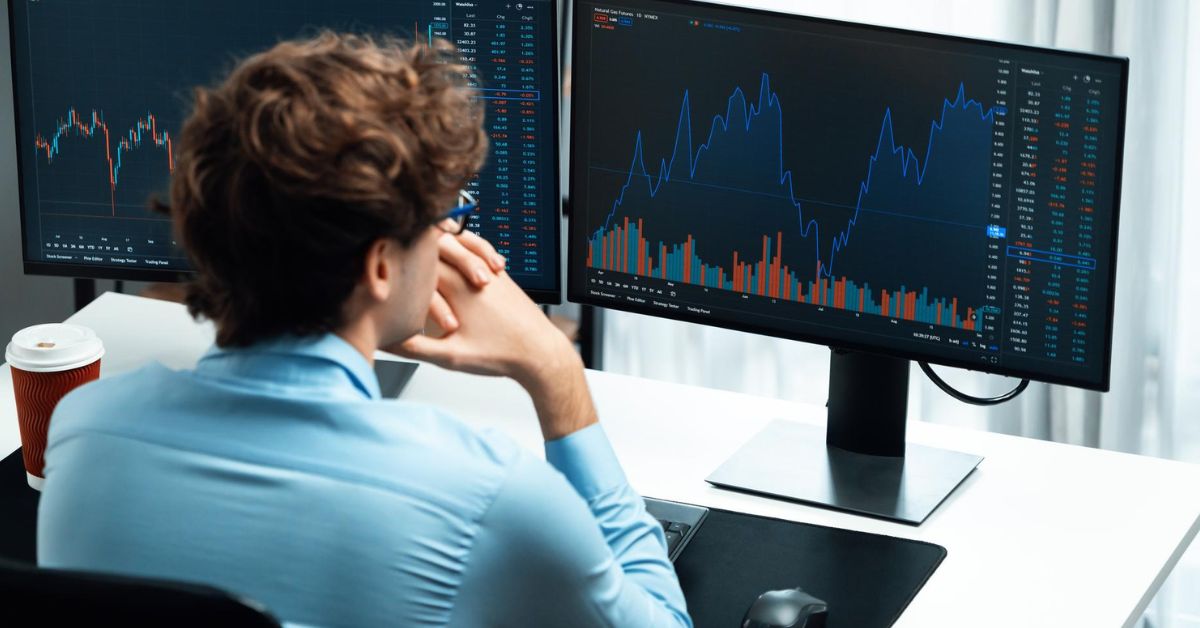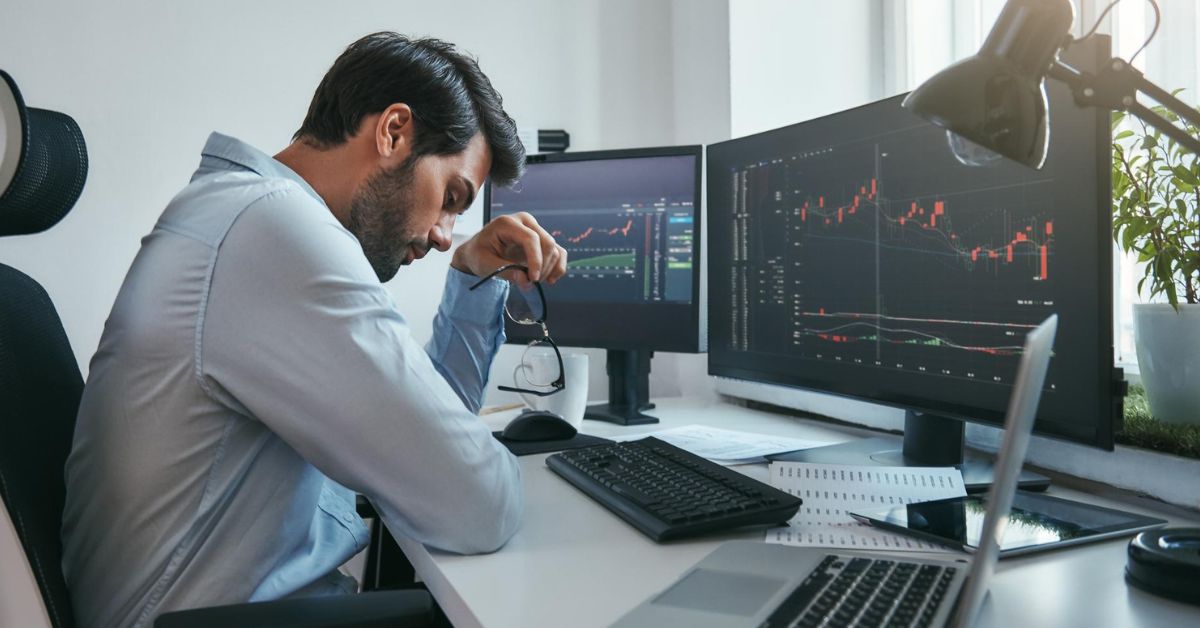Trading can be thrilling, but the fear of missing out (FOMO) often clouds decision-making. This emotion can lead to impulsive decisions and loss of money. The key to developing a successful trading strategy is recognizing FOMO.
In this article, we’ll explore the psychology of trading FOMO. We will examine its triggers, effects, and practical strategies for dealing with it. If you manage FOMO right, it can affect your trading outcomes and long-term success. Having a reliable trading platform like Prime XBT can help traders stay informed and make smart decisions.
The platform offers advanced trading tools that enable users to avoid FOMO-related pitfalls. Trading on such platforms can significantly enhance your experience. So, join PrimeXBT today! Use promo code PRIMEOTT to receive a +7% bonus on your deposit.
What is Trading FOMO?

Trading FOMO stands for the fear of missing out. It’s a common phenomenon among traders. FOMO leads to hasty trading decisions. When traders see others profiting, they feel pressured. This pressure often causes impulsive actions, such as buying high and selling low.
Market movements fuel FOMO. Sudden price jumps or drops create panic, and traders fear missing potential gains. Social media amplifies FOMO. Success stories and hype can mislead traders, and they follow trends without proper analysis.
Emotions play a significant role. Fear and greed drive decisions. These emotions often override rational thinking. In essence, trading FOMO is about regret. Traders regret not taking action sooner. This regret leads to more impulsive trades.
Understanding FOMO cannot be overstated. Recognizing its signs can help manage it. Awareness is the first step in overcoming FOMO.
The Psychological Impact of FOMO on Traders
FOMO has profound psychological effects on traders. It leads to increased stress, impulsive decisions, overtrading, cognitive biases, and reduced confidence. It’s crucial to understand these impacts if you want to develop strategies to deal with FOMO.
Increased Stress and Anxiety
FOMO heightens stress and anxiety for traders. The fear of missing out on profitable trades creates constant pressure. This pressure can become overwhelming. Traders feel they must act quickly. This urgency leads to impulsive decisions.
The market’s unpredictability amplifies anxiety. Price fluctuations cause fear of missing gains. Traders constantly monitor markets, feeling restless. This continuous vigilance exhausts mental resources. Long-term stress impacts overall well-being.
Chronic stress affects decision-making. It clouds judgment and reduces clarity. Traders may make irrational choices, which can lead to financial losses over time. Effective stress management is crucial. Practices like mindfulness help reduce anxiety. Taking breaks from trading is beneficial. Focus on long-term goals, not short-term gains. This approach reduces FOMO-induced stress.
Impulsive Decision-Making
FOMO drives impulsive decision-making in trading. The fear of missing profitable opportunities causes traders to act hastily. They often skip thorough analysis, resulting in poorly informed trades. Impulsivity overrides rational thinking. Traders chase trends without assessing risks. They may buy high and sell low, leading to financial losses.
Emotional trading is risky. Decisions based on fear or greed lack logic. Traders need a clear strategy. Impulsive actions deviate from this plan. Long-term success requires discipline. Stick to your trading strategy. Avoid making decisions based on emotions. Regularly review your trades objectively. It helps identify and correct impulsive behaviors.
Overtrading

FOMO often results in overtrading. Traders feel compelled to enter multiple trades. They fear missing out on potential gains. It leads to excessive trading activity. Overtrading quickly depletes resources. Frequent trades incur higher fees, reducing overall profitability. The more you trade, the more you risk losing.
Emotional exhaustion follows overtrading. Constantly monitoring trades is draining. It can lead to burnout. Overtrading also increases exposure to market risks. Effective risk management is vital. Set clear limits on your trades. Avoid unnecessary trades driven by FOMO. Focus on quality, not quantity. This approach enhances long-term profitability.
Cognitive Biases
FOMO reinforces cognitive biases in trading. Traders follow the crowd, ignoring their strategies. Herd mentality becomes prevalent. This bias leads to poor decision-making. Confirmation bias is common with FOMO. Traders seek information that supports their fears. They ignore data that contradicts it. This skewed perspective hampers objective analysis.
FOMO also triggers recency bias. Recent events weigh more heavily on decisions. Traders react to the latest trends. They neglect long-term patterns and data. Recognize and challenge these biases. Rely on your trading plan. Base decisions on comprehensive analysis. Stay informed, but avoid reacting impulsively. It reduces the impact of cognitive biases.
Reduced Confidence
Frequent losses due to FOMO erode confidence. Traders start doubting their abilities. They question their strategies and decisions. This lack of confidence affects future trades. Confidence is crucial for effective trading. It enables decisive actions. Doubt and hesitation lead to missed opportunities. FOMO-induced losses create a negative feedback loop.
Rebuilding confidence takes time. Focus on your trading successes. Learn from mistakes without dwelling on them. Reaffirm your trading strategy. Continuous learning and practice help regain self-assurance. Seek support if needed. Joining a trading community encourages sharing experiences. Remember, confidence grows with knowledge and persistence.
Common Triggers of Trading FOMO
Various factors can trigger trading FOMO. Understanding these triggers helps traders better manage their emotions. Awareness is the first step in combating FOMO.
Social Media and News
Social media platforms amplify FOMO among traders. Constant updates and success stories create a sense of urgency. Traders feel pressured to act quickly. Influencers and analysts promote trending stocks and cryptocurrencies. Excitement can lead to impulsive trading decisions.
Platforms like Twitter and Reddit can influence market behavior. Traders often follow real-time updates from peers and experts. This flood of information can overwhelm individuals, and they may feel compelled to enter trades based on hype. Such impulsive actions can lead to significant losses.
Market Volatility
Market volatility is a significant trigger for FOMO. Sudden price movements evoke fear of missing profitable opportunities. Traders may rush to capitalize on rapid gains. Volatile markets create an adrenaline rush that is hard to resist. This excitement often clouds rational judgment.
Price spikes or drops can generate panic among traders. Fear of missing out on a rally can lead to hasty decisions. Traders may enter positions without conducting proper analysis. This impulsivity often results in poor trading outcomes.
Success Stories of Other Traders

Hearing about others’ success can ignite FOMO. Traders frequently compare themselves to their peers. Success stories lead to feelings of inadequacy and self-doubt. This comparison encourages traders to chase unrealistic gains quickly. They may disregard their strategies in pursuit of immediate profits.
These narratives can be misleading. Many traders highlight only their successes, omitting failures. This selective sharing creates an unrealistic expectation of trading outcomes, which may lead to excessive risk-taking. Recognizing this pattern is essential for maintaining a balanced perspective.
Personal Financial Goals and Pressures
Personal financial goals can intensify feelings of FOMO. Traders often feel pressured to achieve specific returns within limited time frames, which can lead to reckless trading behavior. Financial responsibilities, like bills and loans, create a sense of urgency. Traders prioritize short-term gains over long-term strategies.
The desire to achieve financial freedom can amplify FOMO. Traders may enter the market unprepared, chasing trends without proper research, which increases the likelihood of significant losses. Setting realistic financial goals can help mitigate these pressures.
FOMO in Group Settings
Being part of a trading community can trigger FOMO. Groupthink can lead to collective impulsive actions among traders. Individuals may feel compelled to follow the crowd blindly. This behavior often results in uncalculated risks. Traders lose their independent decision-making skills in group dynamics.
Group settings can create a false sense of security. The collective enthusiasm may overshadow individual strategies. Traders might enter positions that don’t align with their goals. It can lead to regret and financial loss later. It’s crucial to remain grounded in personal strategies.
Strategies to Combat Trading FOMO
Managing FOMO in trading requires proactive strategies. Implementing effective tactics can significantly improve decision-making. Here are some essential strategies to consider.
Develop a Trading Plan
Creating a solid trading plan is crucial. Your plan should outline your goals, strategies, and risk tolerance. A well-defined plan provides structure and discipline, helping you stay focused on your objectives. Stick to your plan even during market fluctuations.
Review and update your trading plan regularly to ensure it remains relevant to changing market conditions. A clear plan helps reduce emotional trading decisions. Follow your guidelines to avoid falling into FOMO traps.
Set Realistic Goals
Setting realistic trading goals is vital for success. Avoid aiming for unattainable returns or profits. Set achievable targets based on market conditions. It helps manage expectations and reduces pressure.
Break larger goals into smaller, manageable milestones. Celebrate small wins to build confidence. This approach prevents the feeling of urgency. You’ll be less likely to succumb to FOMO.
Limit Exposure to Social Media and News

Reducing exposure to social media can help mitigate FOMO. Limit the time spent on trading forums and news platforms. It helps minimize the influence of external opinions. Focus on your trading strategy rather than others’ successes.
Consider following reputable sources only. Avoid sensationalized news that promotes fear or urgency. Prioritize information that aligns with your trading goals. This will help you maintain a clear perspective.
Practice Mindfulness and Emotional Awareness
Practicing mindfulness can improve emotional regulation. Recognize and acknowledge feelings of FOMO as they arise. Take a moment to reflect before making decisions. Breathing exercises or meditation can help calm your mind.
Emotional awareness enhances self-control during trading. Understanding your emotional triggers and responses allows for better decision-making. When you feel FOMO, pause and evaluate your strategy.
Use Stop-Loss and Take-Profit Orders
Incorporating stop-loss and take-profit orders is essential. These tools help manage risk and protect profits. Set predetermined levels to exit trades automatically. This strategy reduces emotional decision-making during volatility.
Stop-loss orders limit potential losses, providing peace of mind. Take-profit orders secure gains when targets are reached. By using these tools, you can maintain discipline. This approach minimizes the influence of FOMO on your trading.
Our On Tilt Trading Store offers a reliable Stop Loss Calculator. This tool aids traders in determining optimal stop-loss levels for better risk management. Using this calculator, you can set clear exit points based on your risk tolerance. Check out our store today and use promo code OTT10 to receive 10% off your order.
Implement Automated Trading Systems
Automated trading systems can significantly reduce emotional trading decisions. These systems execute trades based on predefined criteria. They operate without human intervention, minimizing emotional influence. Automated strategies follow strict rules and help maintain discipline.
If you’re tired of losing money due to panic selling, FOMO, overtrading, and bag holding, consider the Vestinda trading app. This innovative platform eliminates emotional decision-making by using automated crypto trading strategies. Vestinda empowers you to trade confidently without succumbing to emotional pressures.
Journaling and Self-Reflection

Maintaining a trading journal is a powerful tool. Documenting your trades helps identify patterns and triggers. Self-reflection allows you to learn from past mistakes. This practice promotes personal growth and improves decision-making.
Review your journal regularly to assess your emotional responses. Understand how FOMO has affected your trades. This awareness can help you develop strategies to avoid future pitfalls.
Prioritize Long-Term Success
Shifting your mindset to long-term success can mitigate FOMO. Short-term gains often lead to impulsive decisions. Instead, focus on building a sustainable trading strategy. Emphasizing long-term objectives reduces the pressure of immediate results.
Remember that successful trading is a marathon, not a sprint. Prioritize consistency and risk management over quick profits. This approach fosters a healthier trading mindset and helps you navigate market fluctuations with confidence.
Seek Support from a Trading Community
Engaging with a supportive trading community can be beneficial. Connecting with like-minded traders fosters a sense of belonging. Sharing experiences helps reduce feelings of isolation. A supportive network can provide encouragement and accountability.
Participating in discussions about strategies and challenges can enhance your knowledge and skills. Learning from others’ experiences helps build confidence and reduces the likelihood of succumbing to FOMO.
Read More: What is Greed Trading: A Comprehensive Guide
Conclusion
FOMO can significantly impact trading decisions, leading to emotional mistakes and losses. The key to developing effective strategies is understanding their psychological effects. Making better decisions requires a solid trading plan, realistic goals, and automated systems. Focusing on long-term success and journaling further support healthy trading practices. Trading can be more disciplined and profitable when FOMO is combated.



